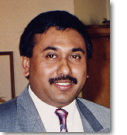 |
|
iMahal Interview Series: Rahul Roy August 22, 2002
 iMahal:
In our interviews we like to tell a whole life story, starting with the
beginning - childhood, heroes, education -- and moving on to career,
interests, and family. So, could we start with your childhood? How did your
formative years lead to your success?
iMahal:
In our interviews we like to tell a whole life story, starting with the
beginning - childhood, heroes, education -- and moving on to career,
interests, and family. So, could we start with your childhood? How did your
formative years lead to your success?
I am the baby of the family. My mother lives with me; she is 83 and still very healthy. My father died 12 years ago. He was a big business man. But most of my time I spent with my older brother. People look at his photograph on my office wall and ask me, "Who is this Hindu guru? I have never seen this guru." I tell them of course you have never seen this guru, he is my brother. And actually, he was my guru. The reason why he was my guru was because when I was growing up, I didn't spend much time with my father because he was so busy with his business. He had a lot of challenges in those days. We come from a family where I think ethics comes first, ahead of everything else. Maybe because of our strong freedom-fighter background. So my father was very dedicated to doing well in his business. So, most of my time, when I was looking for fatherly advice, guidance, energy, and philosophy, my brother would talk to me. And he would talk to me about my father and he would tell me about my uncles. He would tell the story of East Bengal when the revolution started against the British. He would have his opinion. He was more towards Gandhi, not towards violence. My father, because he lost his two brothers and lots of his family in the religious riots during partition, he was more for the side of Neta Ji [Neta Ji Subhash Chandra Bose] that believe in an eye for an eye, a life for a life. iMahal: It seems you were being advised by very conflicting points of view.My father was often upset with my older brother because of his failings.
There was a big rift between him and my dad who lost half of his savings. So when I was growing up, I was seeing my father's empire falling down, especially after he built another factory and then that one also failed. And my two other brothers came here to the US for advanced studies and never went back. They liked the environment, even when they had to sleep out in the park because the job market was bad in those days. My father said to me, "I will not let my youngest son go: you have to run the business."
|
 |
|
 |
|||||
